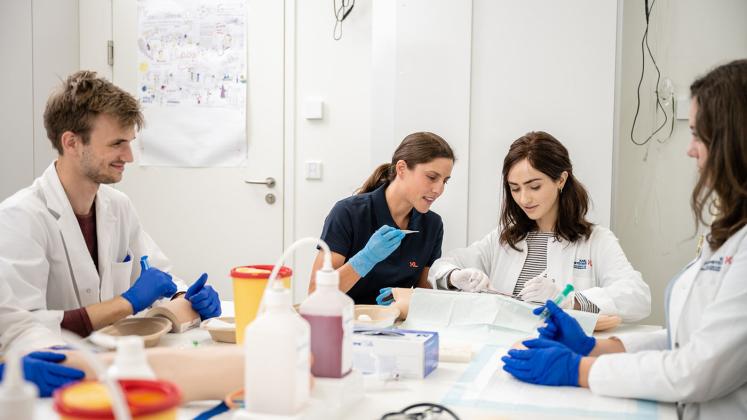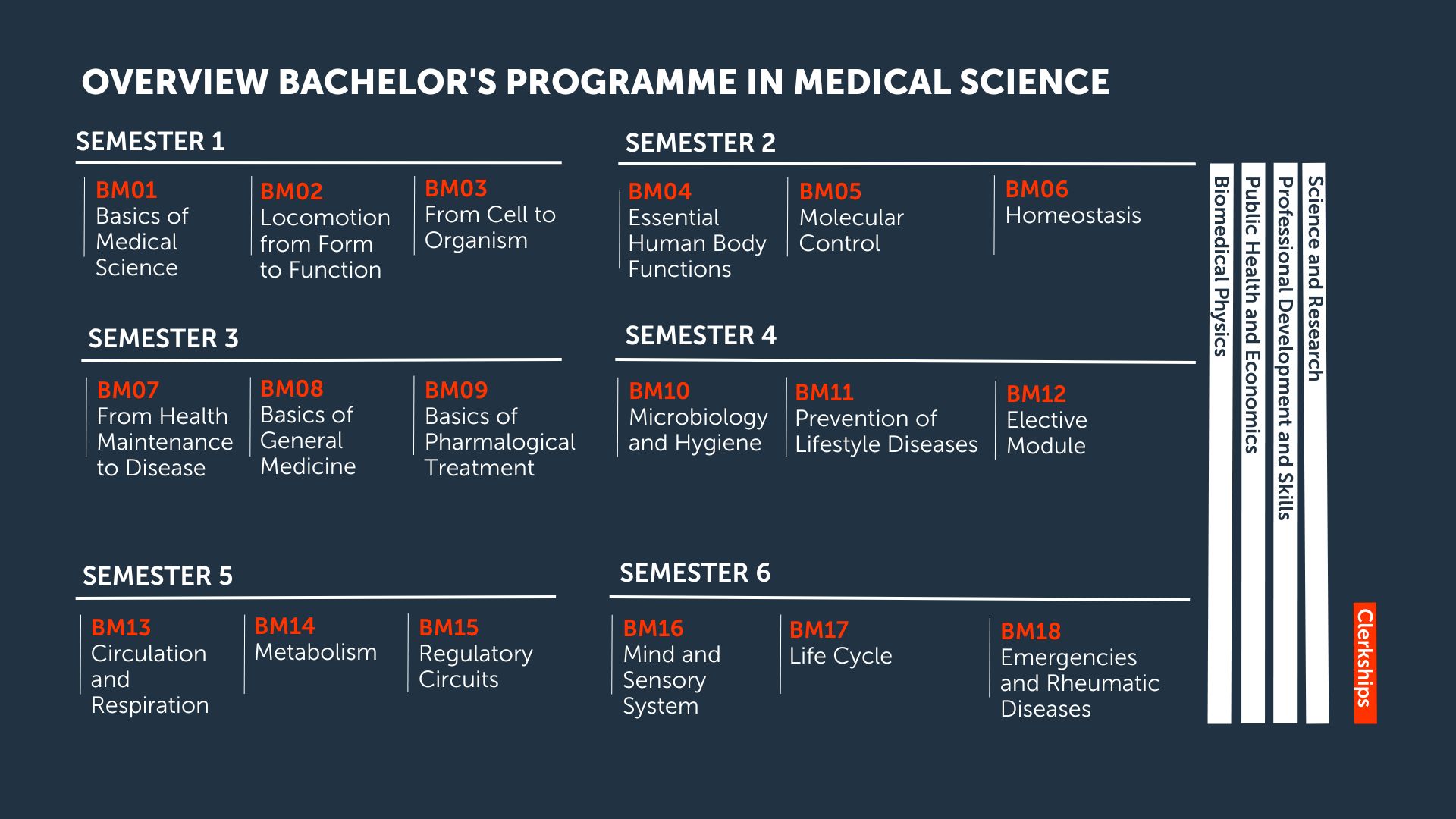
Curriculum
The Bachelor’s degree in Medical Science forms the basis for a postgraduate degree in Human Medicine at Karl Landsteiner University of Health Sciences. In every semester, teaching is delivered in modules. The planned six modules per academic year have a modern spiral curriculum structure, building on one another in content over time. The modules are supplemented by courses from four interdisciplinary lines. These lines run through the entire Bachelor’s programme in Medical Science.

Content of Bachelor’s degree in Medical Science
In the first semester, an introductory module (BM01) provides an overview of Medical Studies at KL and the associated university hospitals in Krems, St. Pölten and Tulln. Students are also taught basic first aid. Lectures and practical exercises in biochemistry, cell biology and molecular biology (BM01, BM03) provide foundational understanding of the physiological processes covered in the module ‘Motion – From Structure to Function’ (BM02). This presents the structural and functional make-up of the human body using the example of the musculoskeletal system. The musculoskeletal system is considered from an anatomical, histological and physiological perspective, following an organ-based curricular model.
Building on the basic knowledge of molecular biology acquired in the first semester, the lectures and practical exercises of the second semester focus on imparting in-depth knowledge of the make-up of the genome, gene expression and diseases associated with changes in genetic material (BM05). In the second semester, students also study the cardiovascular system, the respiratory organs and the nervous system in the module ‘Vital Bodily Functions’ (BM04), and the urinary tract, the reproductive organs and the endocrine glands in the module ‘Homeostasis’ (BM06). The different organ systems are considered from an anatomical and physiological perspective, following an organ-based curricular model.
In the first module of the second year of the programme (BM07), students acquire basic knowledge about disease and the causes of disease, building upon the knowledge of the healthy body gained during first year. The focus now turns to basic concepts of pathology, the functioning of the immune system, and tumour biology and pathology. The module ‘Basics of General Practice’ (BM08) addresses the main topics and the tasks and roles of health professionals in primary healthcare. In the final module of the third semester, ‘Fundamentals of Pharmacology’ (BM09), students acquire foundational knowledge of the principles of pharmacology and toxicology.
The ‘Microbiology and Hygiene’ module (BM10) imparts the fundamental knowledge physicians and health scientists need to understand the complex interactions between the world of microbes and human health. This module also introduces the essential concepts of hygiene measures and strategies to prevent and control the spread of infectious diseases. The aim of the ‘Prevention of Lifestyle Diseases’ module (BM11) is to understand how essential bodily functions behave under physical exertion and thus the importance of regular physical exercise in health. For the final module of the second year(BM12), students can choose from a range of elective modules, which are taught in parallel to other modules (see ‘Elective subjects’).
In the third year of the Bachelor’s degree, students acquire in-depth pre-clinical knowledge and gain an initial insight into specific clinical science, which serves as the basis for the practical clinical training that forms part of the Master’s degree in Human Medicine. Building upon the foundational knowledge of different organ systems acquired in the first year of the degree, these organ systems are now examined from an anatomical, physiological, pathological and pharmacological perspective. Together with the study of macroanatomy and microanatomy, this anatomical approach also includes visualising specific organ systems using diagnostic imaging techniques and establishing the systematic morphology and topography through a dissection course. Following an organ-based curricular model, each module looks at a specific organ system.
This line focuses on health economics, a branch of economics that deals with issues of efficiency, efficacy and fairness in relation to health and healthcare. The secondary focus of this line is public health, which addresses the health of the population as a whole, rather than individual patients. Public health measures aim to prevent diseases, promote health and prolong life for the entire population.
Biomedical physics is an interdisciplinary field that uses physics-based methods to solve medical requirements. This line aims to impart the foundational knowledge required by doctors and health scientists, enabling graduates to apply biomedical physics to diagnostics, monitoring and therapy in day-to-day clinical practice.
This line hones communication, teamwork, self-organisation and medical skills – which, in addition to specialist knowledge, are essential for working as a medical professional. The preparatory course, which teaches specific skills that are vital for completing the clinical traineeship, also forms part of this line. These include basic medical skills such as taking blood, measuring blood pressure, providing an initial consultation when a patient is admitted to hospital and performing physical examinations.
This line teaches basic scientific skills such as conducting literature research, participating in scientific discussions, planning and implementing scientific projects, writing scientific papers and presenting scientific findings. Students are taught how to formulate a research question or hypothesis as part of their Bachelor’s thesis, develop a procedure and methods for addressing their research question, synthesise the results and present them to a panel. It also provides the knowledge that physicians and health scientists require, which enables graduates to interpret medical information based on scientific findings.
Students choose from a wide range of elective subjects to deepen their studies in a chosen areas. Within the Bachelor’s programme, elective subjects are offered as part of the BM12 elective module (see Semester 4 modules). Within this module, students can pick the subject that suits them best from a range of elective modules offered in parallel. In addition to the elective module, for which students must select an elective subject, we also offer “voluntary” elective subjects. These run throughout the academic year and can be completed at any time during the Bachelor’s programme, subject to the respective registration requirements.
The compulsory clerkships are worth 16 ECTS and equate to 16 weeks over the entire Medical Studies. Students can begin their clerkships after completing the preparatory course and passing the clerkship exam (in form of an OSCE) at the end of the second academic year of the Bachelor's programme Medical Science.
Detailed description of the content of the Bachelor’s degree in Medical Science
This section contains a detailed description of the content of the Bachelor’s degree in Medical Science.

